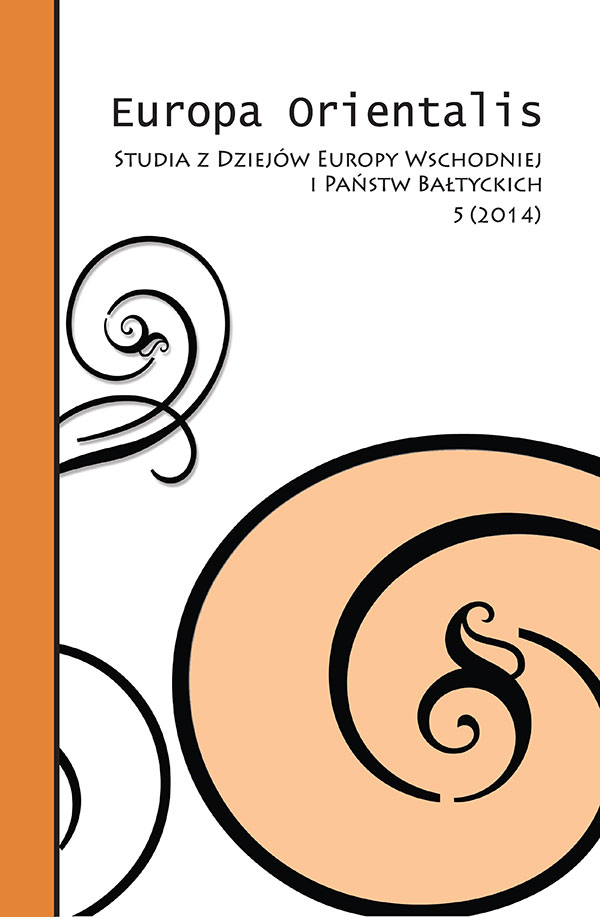Conscription or processional army the case of the Russian Federation
DOI:
https://doi.org/10.12775/EO.2014.008Keywords
military service, Russian Federation, conscription army, professional army, Russian armed forcesAbstract
The main purpose of this article is to examine the current situation of the Russian Armed Forces for possible transition from the conscription army to professional one. Having a conscript army is justified in the states, where is a high risk of external conflict. The peace guarantee for Russia seems to be hers nuclear weapons, which reduces the risk of international conflict. In this case, the rational approach would be to resign from a conscript army. Despite this, specialists claim that over the next few years, the Russian Armed Forces will not become fully professional. It is caused not only by financial reasons and the need to maintain parity of military force with the United States, but also because of the opposition of strong lobby groups associated with the army, which exist in Russia. The generals will not allowed to resign from conscription, because it could harm their individual interests. However, due to the reluctance for military service, the negative demographic processes and the growing demands on soldiers associated with maintaining high-tech equipment, the number of professional soldiers will grow rapidly. On the other hand, in next few years Russian army continues to based on consumption soldiers. The main reason for this is the constant fear, which russian decision-makers have, about the possibility of a conflict that will require the use of reserve service.
References
Flynn G. Q., Conscription and Democracy: The Draft in France, Great Britain, and the US, Westport 2002.
Gayday A., Reform of the Russian army, [w:] Rusia’s New Army, ed. M. Barabanow, D. Glantz, Moskwa 2011.
Haas M. de, Russian-Chinese Military Exercises and their Wider Perspective: Power Play in Central Asia, “Russian Series” October 2005, nr 05/51.
Haas M. de, Russia’s military doctrine development (2000–10), [w:] Russian military politics and russia’s 2010 defense doctrine, ed. S. J. Blank, SSI Monograph, March 2011.
Haas M. de, Russia’s Military Reforms Victory after Twenty Years of Failure?, “Clingendael Papers”, Nr 5.
Herspring D. R., The Continuing Disintegration of the Russian Military, [w:] The Russian Armed Forces at the Dawn of the Millennium, ed. M. H. Crutcner, https://www.hsdl.org/?view&did=442514, [dostęp: 07.02.2014].
Grabowski T. W., Rosyjska siła. Siły Zbrojne i główne problemy polityki obronnej Federacji Rosyjskiej w latach 1991–2010, Częstochowa 2011.
James W.he Moral Equivalent of War, http://www.constitution.org/wj/meow.htm [dostęp: 07.02.2014].
Jędrzejko M., Armie w dobie przemian. Kalendarium najważniejszych wydarzeń w armiach Europy Środkowo-Wschodniej w latach 1989–1997, Warszawa 1997.
Jehn C., Selden Z., The End of Conscription in Europe?, http://www.rand.org/content/dam/rand/pubs/monographs/MG265/images/webS0228.pdf [dostęp: 07.02.2014].
Kamalow N., Komandiry otdeleniy bezgramotnoy armii, „Niezawisimoje Wojennoje Obozrienije” 19 July 2002.
Malcolm N., A. Pravda, Internal Factors in Russian Foreign Policy, Oxford 1996, s. 266, 320, 326; V. L. Manilov, Voyennaya Bezopasnost Rossii, Moskwa 2000.
Myasnikov W., Takaya armiya gosudarstvu ne po karmanu, „Niezawisimoje Wojennoje Obozrienije” 13 January 2006.
Pallin C., Russian Military Reform. A failed exercise in defense decision making,
Londyn‒Nowy Jork, 2009.
Paul R., Conscription Is Slavery, 14 January 2003, http://antiwar.com/paul/?articleid=5651, [dostęp: 07.02.2014].
Powell S. M., Russia’s Military Retrenchment, „Air Force Magazine” August 2001.
Radziwinowicz W., Rosja wciąż chce mieć wielką armię. Poborowi zostają, http://wyborcza.pl/1,75477,14933464,Rosja_wciaz_chce_miec_wielka_armie__Poborowi_zostaja.html [dostęp: 11.02.2014].
Rukavishnikov V., The Military and Society in Post-communist Russia at the Threshold of the 21st Century’, [w:] Military and Society in 21st Century Europe, ed. J. Kuhlmann, J. Callaghan, Londyn 2011.
Rousseau J. J., Social Contract, rozdz. The Roman Comitia, http://www.constitution.org/jjr/socon.htm [dostęp: 07.02.2014].
Russian Army to Expand Conscription Alternative for Students, Ria Novosti, http://en.ria.ru/military_news/20140212/187422622/Russian-Army-to-Expand-Conscription-Alternative-for-Students-.html [dostęp: 05.03.2014].
Russian strategic nuclear forces, http://www.russianforces.org/current/
Spivak A. L., Conscription and reform in the russian army, Washington, D.C. 2006
Śmigielski R, Osierocona armia. Założenia polityki obronnej oraz Siły Zbrojne Federacji Rosyjskiej w latach 1992-2004, Warszawa 2006.
Śmigielski R., Siły Zbrojne Federacji Rosyjskiej trzy lata po konflikcie z Gruzją, „Biuletyn PISM”, Nr 83 (832) 25 sierpnia 2011, http://www.google.pl/url?sa=t&rct=j&q=&esrc=s&source=web&cd=1&ved=0CCoQFjAA&url=http%3A%2F%2Fwww.pism.pl%2Ffiles%2F%3Fid_plik%3D8236&ei-=BPz5UpXFKcKQtQbRroDwDw&usg=AFQjCNH2pB4TRGeOfl1kfVxDlKtnUFMO_g&sig2=StdaCBW5ToZbdvY0IJJCpQ&bvm=bv.61190604,d.Yms [dostęp:11.02.2014].
Top 15 defense budgets, SIPRI Yearbook 2013, http://books.sipri.org/product_info?c_product_id=458# [dostęp: 07.02.2014].
Waldron A, The people with arms and the transition of wars, [w:] The people in arms. Military myth and National Mobilization since the French Revolution, ed. D. Morgan, A. Waldron, Cambridge 2003, s. 256–262.
Wilk A., Rosja wstaje z kolan. Odbudowa potęgi militarnej stała się faktem, http://konflikty.wp.pl/kat,132916,title,Rosja-wstaje-z-kolan-Odbudowa-potegi-militarnej-stala-sie-faktem,wid,15832078,wiadomosc.html [dostęp: 07.02.2014].
Армия, призыв, предложения ЛДПР, Centrum Lewady, http://www.levada.ru/press/2010071401.html [dostęp: 11.02.2014].
Контрактная армия – „за” и „против”, http://maxpark.com/community/5100/content/2271080 [dostęp: 07.02.2014].
Короткевич В. И., История современной Pоссии 1991–2003, Sankt Petersburg 2004.
Крамник И., Реформа Сердюкова – Макарова, „Национальная оборона”, http://www.oborona.ru/includes/periodics/maintheme/2011/1205/13177807/detail.shtml [dostęp: 07.02.2014].
Литовкин В., В России контрактной армии не будет никогда, „Независимая газета”, http://vpk.name/news/90986_v_rossii_kontraktnoi_armii_ne_budet_nikogda.html [dostęp: 11.02.2014].
Литовкин В., Контрактная армия в России: миф или реальность?, http://www.nvspb.ru/stories/kontraktnaya-armiya-v-rossii-mif-ili-realnost-52316 [dostęp: 11.02.1014].
Основы (концепцию) государственной политики РФ по военному строительству на период до 2005 г., http://iam.duma.gov.ru/node/2/4598/16140 [dostęp: 05.03.2014].
Потапов О., Контрактная армия: перезагрузка, http://www.kp.ru/daily/25997/2925564/ [dostęp:11.02.2014].
Российская армия никогда не будет полностью контрактной, заявил Шойгу, Ria Novosti, http://ria.ru/defense_safety/20131109/975715963.html [dostęp: 11.02.1014].
Стратегическое ядерное вооружение России, под ред. П. Л. Подвига, Moskwa 1998.
Фон А., Нужна ли России контрактная армия?, http://shkolazhizni.ru/archive-/0/n-55141/ [dostęp: 11.02.2014].
Шойгу заявил, что в России никогда не будет полностью контрактной армии, http://naganoff.livejournal.com/123206.html [dostęp: 11.02.2014].
Щербаков В., Особенности национальной военной реформы, „Независимая газета”, http://nvo.ng.ru/forces/2008-10-31/1_reform.html [dostęp: 07.02.2014].
Downloads
Published
How to Cite
Issue
Section
Stats
Number of views and downloads: 594
Number of citations: 0



